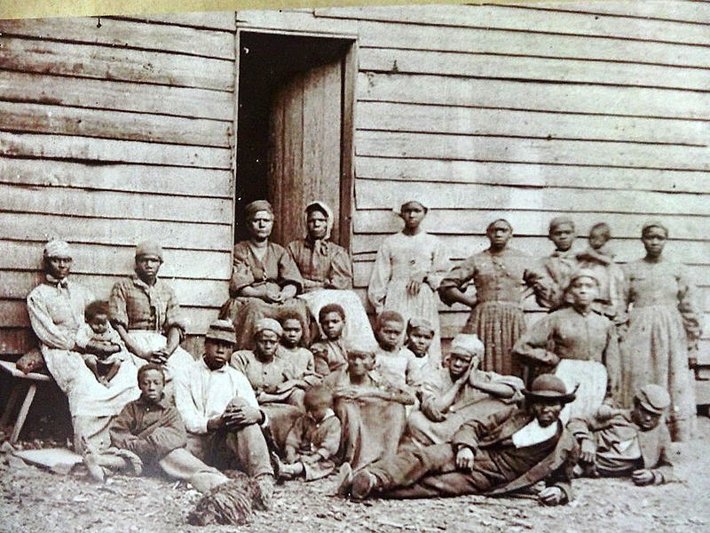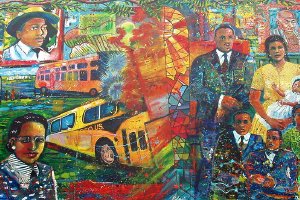Steal away, steal away,
Steal away to Jesus!
Steal away, steal away home,
I ain't got long to stay here.
The overseer took no notice of the solitary singing slave. He was accustomed to this singing. It kept the slaves going as they worked in the fields and established a rhythm for their labor—all good as far as he was concerned.
But to those toiling in the fields, that song meant something more. “Steal Away” was code for tonight’s the night—I’m escaping.

As far back as 1740, the teaching of slaves to read and write was strictly forbidden, so a popular method of passing on ideas was through song. The favored songs were hymns and gospels, those musical forms known by the enslaved throughout the South.
Some hymns, like “Steal Away,” were known as “signal hymns.” Harriet Tubman, who helped some 300 slaves escape bondage, routinely whispered, whistled or sang snatches of hymns to signal a warning or indicate that the coast was clear. “Swing Low, Sweet Chariot,” was her favorite—her sign that she was nearby and to get ready to join her.
Biblical terms and phrases were used as maps or as signs to indicate such things as “danger up ahead.” The River Jordan meant the Ohio River. The promised land was Canada. “Follow the Drinking Gourd” was a reminder to use the Big Dipper constellation to find the North Star and head in that direction. “The wind blows from the South” meant bounty hunters were nearby.
The odds were long that a fugitive slave, especially one who stole away with his family, could endure the entire trek without being caught by bounty hunters or felled by hostile elements. By necessity, faith played a large part in the success of the Underground Railroad, the network of individuals and safe houses working to help slaves escape to the North.
As Frederick Douglass, himself an escaped slave, wrote, "A keen observer might have detected in our repeated singing of 'O Canaan, sweet Canaan, I am bound for the land of Canaan' something more than a hope of reaching heaven. We meant to reach the north—and the north was our Canaan.
“I thought I heard them say, there were lions in the way, I don't expect to stay much longer here
“This was a favorite air and had a double meaning. On the lips of some, it meant the expectation of a speedy summons to a world of spirits; but on the lips of our company, it simply meant a speedy pilgrimage toward a free state, and deliverance from all the evils and dangers of slavery."
Everyone knew the story of Moses and the deliverance of his people from bondage. Everyone knew the Bible-spawned spirituals telling of freedom that became part of the daily world of the plantation.
Spirituals like Go Down Moses, Steal Away, Nobody Knows the Trouble I’ve Seen, Didn’t My Lord Deliver Daniel all spoke to the yearning for freedom from bondage.
A people’s history is often traced through its customs and culture. These run like a stream flowing through time. A deep and lasting part of that current is religion. The way one community expresses its faith may differ, depending on its own needs, from others who espouse that same faith. Christianity has been the religion of choice for many Black Americans through the generations. Yet that faith has played a far different role for the African American community than Christianity as practiced in other parts of the world. That legacy—spotlighted this Black History Month—has gifted that religion with its own indelible hallmark.
For Black Americans, the outward manifestations that define Christianity—its prayers, its stories, its gospel songs and hymns—all meant refuge not just for the soul but also, especially during the years of the Underground Railroad, for life itself.
_________________
From its beginnings, the Church of Scientology has recognized that freedom of religion is a fundamental human right. In a world where conflicts are often traceable to intolerance of others’ religious beliefs and practices, the Church has, for more than 50 years, made the preservation of religious liberty an overriding concern.
The Church publishes this blog to help create a better understanding of the freedom of religion and belief and provide news on religious freedom and issues affecting this freedom around the world.
The Founder of the Scientology religion is L. Ron Hubbard and Mr. David Miscavige is the religion’s ecclesiastical leader.
For more information, visit the Scientology website or Scientology Network.


